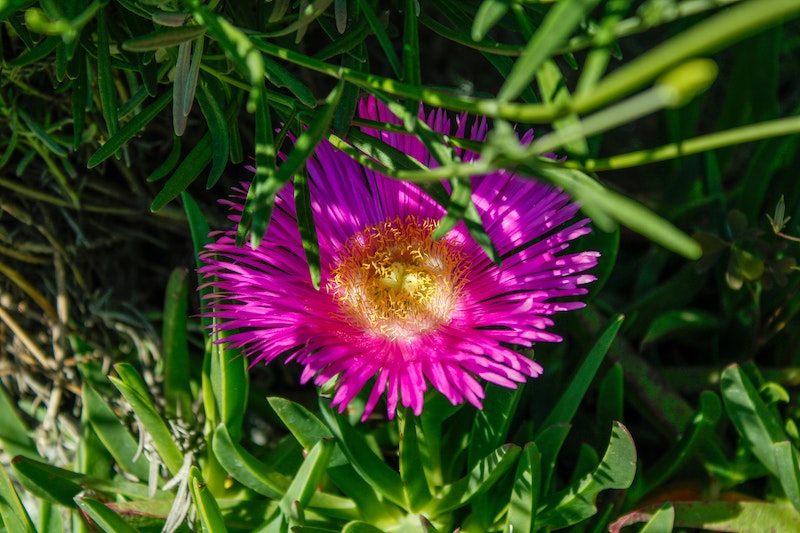Ice plants are flowering succulents that are easy to maintain and make excellent ground cover. These plants are non-toxic to people and pets, and wonderful to grow in yards and outdoor spaces with little ones, cats, or dogs. The foliage is edible and has a sour taste. While it is safe to eat Delosperma foliage, it is advisable only to do so if you are familiar with the plant and how to prepare it properly.

Are Ice Plants Poisonous to Children?
Ice plants are not poisonous to children. Touching or ingesting the plant is not dangerous or harmful. Overeating anything can cause an upset stomach, and eating the plant can be detrimental if insecticides or other products are applied to the foliage. It is always best to exercise caution, but ice plants are safe.
Are Ice Plants Poisonous to Dogs?
Ice plants are safe to have around pets like dogs. Eating any part of Delosperma will not hurt puppies or dogs. Ice plants are not toxic, so even if your curious pet bites, chews, or eats the plant, you can rest assured your dog is safe.
Are Ice Plants Poisonous to Cats?
Ice plants are not likely to entice a curious cat, but your feline will be fine if they do eat the plant. Delosperma is not poisonous or toxic to cats, including kittens. The entire plant is safe and not harmful if eaten by cats or other animals.
Are Ice Plants Poisonous to Other Animals?
Ice plants are not poisonous to other animals, making Delosperma a safe addition to a yard or outdoor space. The plants are not known to be dangerous or toxic if eaten. The entire plant is safe, although eating too much of anything can cause an upset stomach.
Symptoms Of Ice Plants Poisoning
Ice plants are not poisonous, but it is still best to know if your child or pet eats anything from your yard. While Delosperma is not toxic, eating a lot of something can still cause a stomach ache. Always check with your doctor or veterinarian for guidance if you suspect Ice Plant poisoning.
Preventing Ice Plants Poisoning
Ice plants are safe to consume, but it is still reasonable to take measures to prevent pets or other animals from damaging these plants. Barriers like fences or scent-based deterrents effectively keep animals away from ice plants. Feature the plants in a hanging basket so the plant is not reachable, but you can still enjoy the creeping stems and lovely flowers.
Pet Poison Helpline
If something were to happen to your furry friend, and you suspect that they are suffering from Ice Plants poisoning, there is a poison control hotline to call for 24/7 vet advice. It is called the Pet Poison Hotline, and their phone number is (855) 764-7661.
 |
Author Alison Cotsonas - Published 06-05-2023 |
